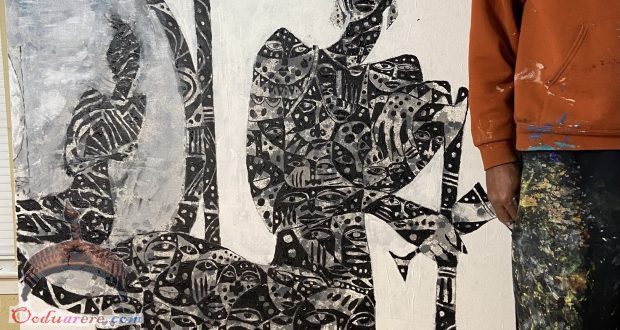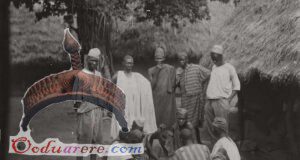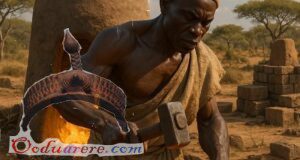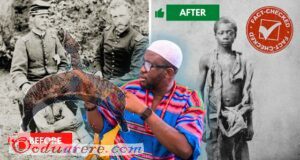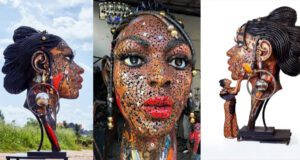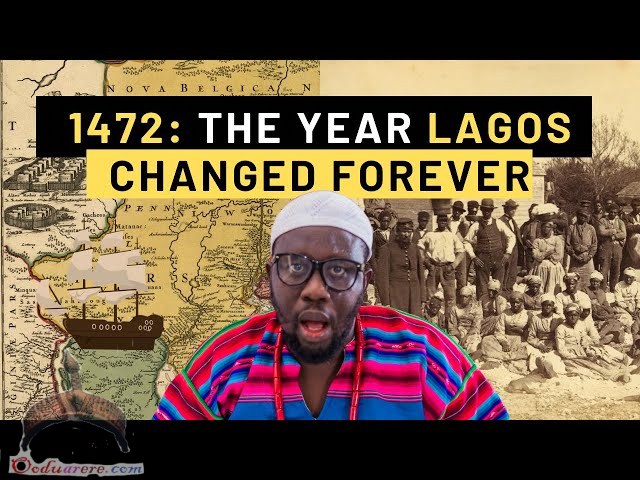Fear gradually gripped me, as I sat there in the hot shop with my father, my mother, and other relatives, waiting for a crowd of assorted characters gathered in front of the shop to set us ablaze.
I was not thinking.
Rather, several things were dashing through my mind.
What would it feel like to be set on fire?
Miraculously, I was no longer hungry.
I controlled the motion to throw up as it welled up my stomach.
Several of the characters standing outside the shop, looking perplexed, excited, and anxious caught my attention briefly.
Vividly, I recalled them, their anxiety, their anticipation, their helplessness, and their cluelessness about what was happening around them.
Just like me, spectators in our lives, waiting for them to make the next move.
There was Ọparun-ń-wọ-gáùn.
The bamboo pole wearing a gown.
What a sexist mentality fed my childhood concept of being human.
Ọparun-ń-wọ-gáùn, this sheer bamboo pole that dared to wear a gown was the most gorgeous young woman of about sixteen.
At that age, I consumed imageries largely through sound and not what I had experienced.
Ọparun-ń-wọ-gáùn was blooming and her entire being radiated light, energy, purity, and sheer spiritual fermentation.
There was a wave of Ankara fashion in vogue at that time, and Ọparun-ń-wọ-gáùn was always adorned in brilliantly colored attires, sporting a tiny dress cut tight and up above the knees.
The style was common among our sisters at that time.
There were three stereotypes of our sisters at play on our streets: we called them illiterates, half-educated, and over-educated, none of which was good.
We had street eyes for telling one from the other.
The first category consisted of the indigenous ìbílẹ̀ sisters, almost no “education,” because we were raised to think in those days that only those who went to western or “formal” schools were educated.
The secondary category is the one to which Ọparun-ń-wọ-gáùn belongs.
She has read up to Primary School class six, where free education ended in those days.
Her parents would now be expected to fund her education, once she completed her primary six education.
The Awolowo government had brought free formal education up to the first six years of Western Nigeria, and every child, boy or girl in the neighborhood, was expected to attend school.
Almost every child, except the Ọmọ Ọ̀dọ̀—about whom we will talk some other day.
Ọparun-ń-wọ-gáùn was the first generation of her family to experience formal education.
Ọparun-ń-wọ-gáùn grew up first in a loosely defined family when the concepts of monogamy and polygamy were developing complications of colonial western morality, religion, and politics.
The west was changing us dramatically and drastically.
A culture of educated elites was emerging, but not for Ọparun-ń-wọ-gáùn, whose education stopped at the Primary six levels.
The last level of education you needed at that point was the Modern Three certificate, to teach at the primary school level.
Ọparun-ń-wọ-gáùn was educated below Modern Three.
You couldn’t do much with that.
People like Ọparun-ń-wọ-gáùn were caught between two classes; the lowest level referred to as illiterates were connected to the land, farming, and the indigenous markets.
The over-educated ladies had a connection.
Ọparun-ń-wọ-gáùn’s prospects were limited.
She must get married as soon as she could, otherwise, there would be too many stories made up told about her in the neighborhood.
In those days, fiction writing was an active sport on the street, except it was an oral tradition passed from ear to ear.
There were no television, movies, or video games to play on the phone.
All we had to watch was the big screen on the street.
Nobody was too stupid to point their fingers at anybody.
You learned by age three how to point at people using only your mouth, the way you slightly twist it. Or your eyes; your nose.
You learned to turn your back to the subject of your gossip.
As long as the streets existed, the ladies were the stars of the movies and Ọparun-ń-wọ-gáùn and her friends were spotlights.
She would be given too many names, such as Ọparun-ń-wọ-gáùn.
Nobody would know her real name.
Everybody would call her Ọparun-ń-wọ-gáùn.
I remember the day I was greeting her, just drawn to her by the radiance of her aura, and I hailed, “Anti Ọparun-ń-wọ-gáùn, how are you doing!”
As a four-year-old, I felt that adding “antí” to her name was all I needed to do.
Probably it was the flowery patterns on her gown, I can’t tell.
But something compelled me to greet her.
But she snapped back with “Can you call your own sister Ọparun-ń-wọ-gáùn?”
That was the first time I was called out so publicly.
Clearly, I said something wrong.
But Anti Ọparun-ń-wọ-gáùn looked so upset with me that I could not ask her to explain anything to me.
Best to crawl away home.
It was a culture in which you were supposed to know things from home: things weren’t supposed to be explained to you on the street.
So when I got home, I was really upset and asked everybody why nobody told me it was offensive to call Anti Ọparun-ń-wọ-gáùn by her name.
“Don’t tell me you called her—what!!!?”
Everybody gathered around me.
“So, what did she do to you?” one of my sistas wanted to know. Only Olodumare knew how many sistas I had in those days.
They would all crowd around my head.
“Did she kill you?” someone asked.
“If you had any brain between your ears,” someone said, “something should have told you that—”
“If they asked you to poke your fingers into a burning stove,” someone asked, “would you have done that?”
I learned my lesson the hard way about Ọparun-ń-wọ-gáùn, but I didn’t fully get it until my mother explained things to me.
It was offensive to call someone Ọparun-ń-wọ-gáùn because it was not kind to use images like that for people.
Young women like Ọparun-ń-wọ-gáùn got all sorts of socially undesirable names such as asewo, public dog, anfani adugbo, kofoorun, thrown at them by frustrated young men in the community, my mother explained.
I was to be careful not to call people those names, my mother instructed me.
As a child of about four, I didn’t factually know anything about Ọparun-ń-wọ-gáùn, yet I had been led to view her as an outsider already.
Perhaps I saw Ọparun-ń-wọ-gáùn as an outsider because I realized that my formal education was not going to terminate at the primary school level and that I had more opportunities.
Young women like Ọparun-ń-wọ-gáùn were in big trouble.
Many parents did not consider sending their female children such as Ọparun-ń-wọ-gáùn to school beyond the free primary education.
They didn’t see it as worthwhile, because the girl was going away to become someone else’s wife.
But a lot of people were also taking advantage of the opportunities of formal education and were sending boys and girls to school.
Ọparun-ń-wọ-gáùn saw me as I stepped out of the school compound that day.
“Come, quick, Moyo!” she said to me, whispering. “Duck, don’t let them see you! Come and hide inside our house!”
I didn’t know what she was saying. I thought maybe she was still upset that I called her Anti Ọparun-ń-wọ-gáùn.
I walked straight past her. I wanted to run home away from her.
When I turned the corner to the main street, I met the restive crowd gathered in front of my mother’s shop.
It was while I was pushed into the shop, and looked around me at my mother, father and relatives also trapped within the shop that the story was becoming clear to me.
I began to understand what Ọparun-ń-wọ-gáùn was trying to do.
She was trying to save my life.
She was my Valentine. I completed painting her on Valentine’s Day.
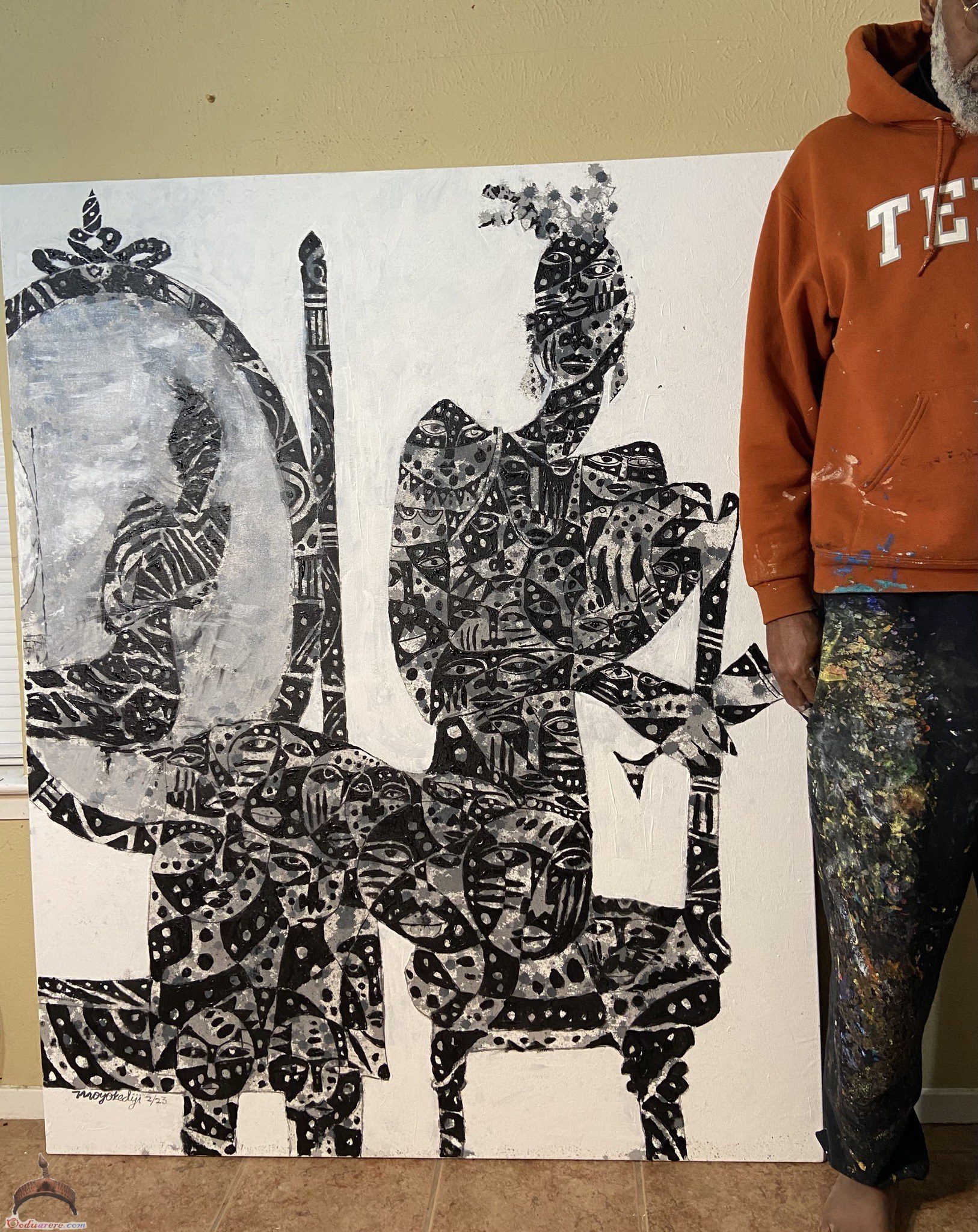
Prof.Moyo Okediji
 Ọmọ Oòduà Naija Gist | News From Nigeria | Entertainment gist Nigeria|Networking|News.. Visit for Nigeria breaking news , Nigerian Movies , Naija music , Jobs In Nigeria , Naija News , Nollywood, Gist and more
Ọmọ Oòduà Naija Gist | News From Nigeria | Entertainment gist Nigeria|Networking|News.. Visit for Nigeria breaking news , Nigerian Movies , Naija music , Jobs In Nigeria , Naija News , Nollywood, Gist and more

